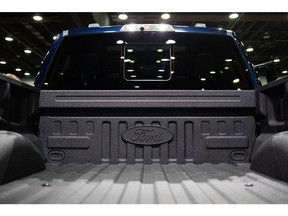
Article content
(Bloomberg) — Ford Motor Co. intensified its campaign to preserve clean energy manufacturing subsidies Monday, warning jobs at its electric-vehicle battery plant in southwestern Michigan could be at risk if Republicans in Congress pare back tax credits in President Donald Trump’s multi-trillion dollar economic package.
THIS CONTENT IS RESERVED FOR SUBSCRIBERS ONLY
Subscribe now to read the latest news in your city and across Canada.
- Exclusive articles from Barbara Shecter, Joe O'Connor, Gabriel Friedman, and others.
- Daily content from Financial Times, the world's leading global business publication.
- Unlimited online access to read articles from Financial Post, National Post and 15 news sites across Canada with one account.
- National Post ePaper, an electronic replica of the print edition to view on any device, share and comment on.
- Daily puzzles, including the New York Times Crossword.
SUBSCRIBE TO UNLOCK MORE ARTICLES
Subscribe now to read the latest news in your city and across Canada.
- Exclusive articles from Barbara Shecter, Joe O'Connor, Gabriel Friedman and others.
- Daily content from Financial Times, the world's leading global business publication.
- Unlimited online access to read articles from Financial Post, National Post and 15 news sites across Canada with one account.
- National Post ePaper, an electronic replica of the print edition to view on any device, share and comment on.
- Daily puzzles, including the New York Times Crossword.
REGISTER / SIGN IN TO UNLOCK MORE ARTICLES
Create an account or sign in to continue with your reading experience.
- Access articles from across Canada with one account.
- Share your thoughts and join the conversation in the comments.
- Enjoy additional articles per month.
- Get email updates from your favourite authors.
THIS ARTICLE IS FREE TO READ REGISTER TO UNLOCK.
Create an account or sign in to continue with your reading experience.
- Access articles from across Canada with one account
- Share your thoughts and join the conversation in the comments
- Enjoy additional articles per month
- Get email updates from your favourite authors
Sign In or Create an Account
or
Article content
The $3 billion plant in Marshall, about 100 miles west of Detroit, is slated to produce 20 gigawatt-hours of lithium iron phosphate, or LFP batteries, and employ 1,700 people after it starts production in 2026. The 2 million-square-foot site, which is still under construction, has drawn intense political scrutiny since it was announced in 2023 because Ford is licensing the technology to build the batteries from China’s Contemporary Amperex Technology Co. Ltd, the world’s largest battery manufacturer.
Article content
Article content
Article content
“It would be a shame to build these facilities and then all of a sudden you have to scale back on the most important part of it, which is people,” Lisa Drake, Ford’s vice president of platform programs and EV systems, told reporters during a tour of the plant in Marshall on Monday. “We want to spend our investment creating manufacturing jobs here.”
Article content
By signing up you consent to receive the above newsletter from Postmedia Network Inc.
Article content
At risk in Congressional budget negotiations is a production tax credit in President Biden’s Inflation Reduction Act known as 45X. The law incentivizes manufacturing of battery cells and packs in the US. Ford would stand to earn about $2.3 billion between 2026 and 2029 under the current law, according to data firm Benchmark Minerals.
Article content
Ford Executive Chair Bill Ford said at a policy conference last month that the Marshall plant would be at risk if Congress nixed the 45X credits.
Article content
“It’s not fair to change policy after all the expenditures have been made,” he said at the time.
Article content
China dominates production of LFP batteries, which are cheaper and more stable than nickel-based alternatives popular in the west. Ford has argued that licensing LFP technology from CATL will help it catch up faster to Chinese EV companies, and that it wholly owns and controls the Marshall plant, which it says would be the first in the US to make LFP cells for automotive applications.
Article content
Article content
The legislative risks mark the latest potential hurdle for the Ford plant. It was originally intended to produce enough batteries for 400,000 EVs, part of an earlier ambitious plan to electrify Ford’s lineup. The automaker later reduced that target to power about 230,000 EVs as consumer demand for the technology faltered.
Article content
To better compete on price, Ford Chief Executive Officer Jim Farley has tasked a former Tesla executive and a “skunkworks” team of engineers and designers in California with developing a line of small EVs starting under $30,000. The Marshall plant would supply batteries for those next generation models.
Article content

.jpg) 6 hours ago
1
6 hours ago
1
 English (US)
English (US)